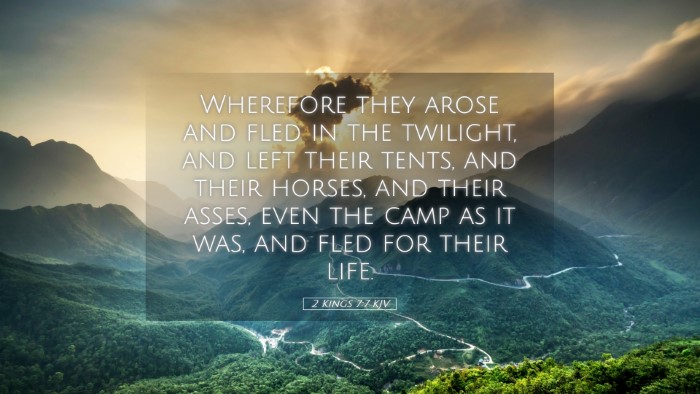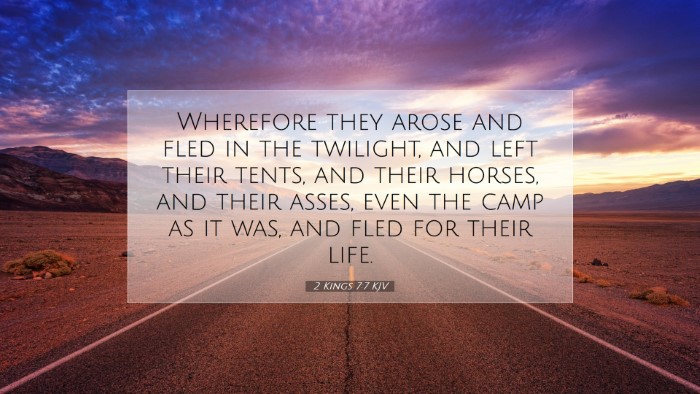Old Testament
Genesis Exodus Leviticus Numbers Deuteronomy Joshua Judges Ruth 1 Samuel 2 Samuel 1 Kings 2 Kings 1 Chronicles 2 Chronicles Ezra Nehemiah Esther Job Psalms Proverbs Ecclesiastes Song of Solomon Isaiah Jeremiah Lamentations Ezekiel Daniel Hosea Joel Amos Obadiah Jonah Micah Nahum Habakkuk Zephaniah Haggai Zechariah Malachi2 Kings 7:7
2 Kings 7:7 KJV
Wherefore they arose and fled in the twilight, and left their tents, and their horses, and their asses, even the camp as it was, and fled for their life.
2 Kings 7:7 Bible Commentary
Commentary on 2 Kings 7:7
Verse: "Wherefore they arose and fled in the twilight, and left their tents, and their horses, and their asses, even the camp as it was, and fled for their life."
Introduction
This verse occurs in the context of the miraculous deliverance of the besieged city of Samaria during a time of severe famine. The chapter illustrates God's providential hand in delivering His people from imminent danger. The insights from respected public domain commentaries shed light on the implications of the actions of the lepers and the absolute sovereignty of God in their circumstances.
Contextual Background
The siege of Samaria had led to dire circumstances, characterized by severe famine and desperation among its inhabitants. The Assyrian army surrounded the city, creating a situation of hopelessness. In this dark scenario, the narrative concerning the lepers emerges as a beacon of hope, showing how God can turn despair into deliverance.
Analysis of the Actions of the Lepers
The lepers in this narrative acted decisively in a time of uncertainty. According to Matthew Henry's Commentary, their decision to "arose and fled" indicates a moment of faith. They recognized that remaining in their condition would lead to certain death. Their boldness in the face of fear exemplifies the theme of divine providence acting through human initiative.
Adam Clarke adds that this fleeing was not merely an act of panic but a calculated risk resulting from desperation. The lepers’ decision showcases the importance of action in faith; often the first step toward receiving God's deliverance involves taking a leap of faith. Clarke emphasizes this important principle, suggesting that God often blesses action rather than inaction.
The Significance of Twilight
In the phrase “in the twilight,” there is a symbolic representation of transition and uncertainty. Twilight is a time when darkness is giving way to light, paralleling the change from despair to hope. Albert Barnes notes that this time of day can signify both literal and metaphorical transitions, emphasizing that God's help often comes when least expected and within the stages of uncertainty.
Divine Intervention
Critically, the act of the lepers fleeing towards the Syrian camp is portrayed as an extraordinary act of faith. Barnes highlights the significance of God's divine intervention in the midst of their plight. It is crucial to note that while the lepers acted, it was God's orchestrating hand that led to the fall of the Syrian army, providing complete freedom for the Israelites.
The Camp Left as It Was
The statement “left their tents, and their horses, and their asses, even the camp as it was” speaks volumes about the supernatural nature of God’s deliverance. This point is discussed in depth by Matthew Henry, who asserts that this manifestation of overwhelming fear among the Syrians resulted in a miraculous retreat. Their abandonment of the camp symbolizes how God can cause confusion among the enemy, upholding His covenant to protect His people.
Theological Implications
The theological significance of this passage is profound. It reminds readers of God’s sovereignty and ability to deliver His people from seemingly hopeless situations. Adam Clarke posits that the reaction of the lepers and the retreat of the Assyrians reflects God’s control over the affairs of nations and the fulfillment of His promises. This account encourages believers to trust in God’s power and timing.
Application for Modern Believers
In light of this narrative, modern believers can draw meaningful applications. The lepers’ faith-filled decision prompts contemporary Christians to act, even when the situation appears bleak. Albert Barnes emphasizes this call to action – what may seem like a risky step could lead to God’s greater plan being unveiled. In essence, waiting passively in despair is in contradiction to the robust faith that God desires from His people.
Conclusion
2 Kings 7:7 encapsulates a moment where human desperation meets divine intervention. The insights garnered from the commentaries by Matthew Henry, Albert Barnes, and Adam Clarke highlight the multifaceted nature of this verse. It serves as an enduring reminder for pastors, students, theologians, and Bible scholars to understand the dynamics of faith and action, the realities of divine providence, and the constant hope found in trusting God, even amid adversity.


